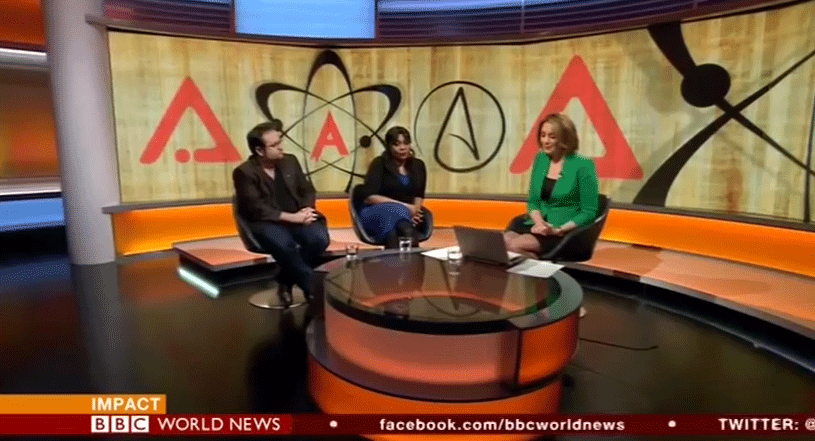BBC World covers prejudice against atheists and our report
The BBC covered the IHEU Freedom of Thought report this week, as part of a segment on prejudice against atheists in Egypt and around the world. Bob Churchill, editor of the 2013 report, introduces the video below.

Bob Churchill of IHEU, and Lola Efuntade-Tinubu of London Black Atheists, discuss prejudice against atheists on BBC World Impact
I was pleased to take part in a discussion on BBC World’s Impact on Tuesday. The topic was prejudice against atheists and the difficulty of speaking out as non-religious in countries with both social and legal discrimination.
The segment opens with footage of brave atheists speaking out in Egypt, despite evident prejudice: a passerby interrupts the recording at one point to attack the very idea that atheists should be filmed on camera, shouting, “He’s an atheist and they are interviewing him! They’re telling him to spread his lies.”
One of the young atheists themselves simply explains, “I don’t want to leave Egypt. I want to be an atheist in my country, with my family and my job.” Though most of the atheists interviewed have their names captioned, one interviewee has her face blurred to protect her identity.
The reporter also speaks to a cleric whose opening statement is: “As much as we detest atheism, we also detest extremism and clinging onto formalities which push people away from religion. We blame the extremists for making some people think that religion is inflexible.” He may think of himself as a moderate, but comparing disbelief in God to “extremism” belies a deep-seated prejudice.
Back in the studio, I spoke alongside Lola Tinubu of the London Black Atheists. Lola has been interviewed previously by New Statesman, speaking on how she began to question the evangelical Christianity she grew up with in Nigeria when it was used as a justification for gender inequality and as an excuse to ignore scientific findings. In the programme this week she explains how religion seemed all-encompassing, when “everything you are meant to do is based on what God says”. She tells how, when she said she didn’t believe in God, her family and friends were “very sad, very upset, and some deeply offended”.
We went on to discuss the kinds of social taboo and legal discrimination against the non-religious, and the protection that should be afforded to atheists to think and believe as a human right. Agreeing that atheists are sometimes maligned, I asked why that should be, explaining that atheists “are just people who for one reason or another, not always because of extremism but maybe they just intellectually, honestly thought about these questions and decided, ‘Yeah, I don’t think there’s a God, I think there are other ways, other moral philosophy like Humanism, that means that I should be good and can be good.’ They’re not evil people who should be held to account by their friends and family.”
A full video of the segment is below:


